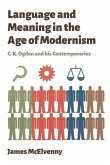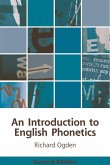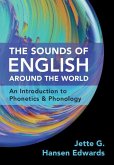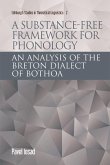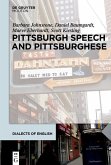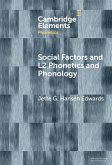Historical Dialectology in the Digital Age (eBook, ePUB)
Redaktion: Alcorn, Rhona; Molineaux, Benjamin; Los, Bettelou; Kopaczyk, Joanna
20,95 €
20,95 €
inkl. MwSt.
Sofort per Download lieferbar

10 °P sammeln
20,95 €
Als Download kaufen

20,95 €
inkl. MwSt.
Sofort per Download lieferbar

10 °P sammeln
Jetzt verschenken
Alle Infos zum eBook verschenken
20,95 €
inkl. MwSt.
Sofort per Download lieferbar
Alle Infos zum eBook verschenken

10 °P sammeln
Historical Dialectology in the Digital Age (eBook, ePUB)
Redaktion: Alcorn, Rhona; Molineaux, Benjamin; Los, Bettelou; Kopaczyk, Joanna
- Format: ePub
- Merkliste
- Auf die Merkliste
- Bewerten Bewerten
- Teilen
- Produkt teilen
- Produkterinnerung
- Produkterinnerung

Bitte loggen Sie sich zunächst in Ihr Kundenkonto ein oder registrieren Sie sich bei
bücher.de, um das eBook-Abo tolino select nutzen zu können.
Hier können Sie sich einloggen
Hier können Sie sich einloggen
Sie sind bereits eingeloggt. Klicken Sie auf 2. tolino select Abo, um fortzufahren.

Bitte loggen Sie sich zunächst in Ihr Kundenkonto ein oder registrieren Sie sich bei bücher.de, um das eBook-Abo tolino select nutzen zu können.
Drawing on the resources created by the Institute of Historical Dialectology at the University of Edinburgh this volume illustrates how traditional methods of historical dialectology can benefit from new methods of data-collection to test out theoretical and empirical claims.
- Geräte: eReader
- mit Kopierschutz
- eBook Hilfe
- Größe: 4.53MB
- FamilySharing(5)
Andere Kunden interessierten sich auch für
![Language and Meaning in the Age of Modernism (eBook, ePUB) Language and Meaning in the Age of Modernism (eBook, ePUB)]() James McelvennyLanguage and Meaning in the Age of Modernism (eBook, ePUB)16,95 €
James McelvennyLanguage and Meaning in the Age of Modernism (eBook, ePUB)16,95 €![Introduction to English Phonetics (eBook, ePUB) Introduction to English Phonetics (eBook, ePUB)]() Richard OgdenIntroduction to English Phonetics (eBook, ePUB)18,95 €
Richard OgdenIntroduction to English Phonetics (eBook, ePUB)18,95 €![Phonetics and Phonology of Heritage Languages (eBook, ePUB) Phonetics and Phonology of Heritage Languages (eBook, ePUB)]() Phonetics and Phonology of Heritage Languages (eBook, ePUB)97,95 €
Phonetics and Phonology of Heritage Languages (eBook, ePUB)97,95 €![Sounds of English Around the World (eBook, ePUB) Sounds of English Around the World (eBook, ePUB)]() Jette G. Hansen EdwardsSounds of English Around the World (eBook, ePUB)26,95 €
Jette G. Hansen EdwardsSounds of English Around the World (eBook, ePUB)26,95 €![Substance-free Framework for Phonology (eBook, ePUB) Substance-free Framework for Phonology (eBook, ePUB)]() Pavel IosadSubstance-free Framework for Phonology (eBook, ePUB)21,95 €
Pavel IosadSubstance-free Framework for Phonology (eBook, ePUB)21,95 €![Pittsburgh Speech and Pittsburghese (eBook, ePUB) Pittsburgh Speech and Pittsburghese (eBook, ePUB)]() Barbara JohnstonePittsburgh Speech and Pittsburghese (eBook, ePUB)97,95 €
Barbara JohnstonePittsburgh Speech and Pittsburghese (eBook, ePUB)97,95 €![Social Factors and L2 Phonetics and Phonology (eBook, ePUB) Social Factors and L2 Phonetics and Phonology (eBook, ePUB)]() Jette G. Hansen EdwardsSocial Factors and L2 Phonetics and Phonology (eBook, ePUB)15,95 €
Jette G. Hansen EdwardsSocial Factors and L2 Phonetics and Phonology (eBook, ePUB)15,95 €-
-
-
Drawing on the resources created by the Institute of Historical Dialectology at the University of Edinburgh this volume illustrates how traditional methods of historical dialectology can benefit from new methods of data-collection to test out theoretical and empirical claims.
Dieser Download kann aus rechtlichen Gründen nur mit Rechnungsadresse in A, B, BG, CY, CZ, D, DK, EW, E, FIN, F, GR, HR, H, IRL, I, LT, L, LR, M, NL, PL, P, R, S, SLO, SK ausgeliefert werden.
Produktdetails
- Produktdetails
- Verlag: Edinburgh University Press
- Erscheinungstermin: 3. Januar 2019
- Englisch
- ISBN-13: 9781474430562
- Artikelnr.: 54912107
- Verlag: Edinburgh University Press
- Erscheinungstermin: 3. Januar 2019
- Englisch
- ISBN-13: 9781474430562
- Artikelnr.: 54912107
- Herstellerkennzeichnung Die Herstellerinformationen sind derzeit nicht verfügbar.
Rhona Alcorn is an Honorary Research Fellow at the University of Edinburgh and CEO of Scots Language Dictionaries Ltd. She is also Deputy Director of the Angus McIntosh Centre for Historical Linguistics. She was the first receipient of the Richard M. Hogg Prize, awarded annually by the International Society for the Linguistics of English since 2008. Joanna Kopaczyk is Lecturer in English Language & Linguistics at the University of Glasgow. She is a historical linguist with an interest in formulaic language, the history of Scots and historical multilingualism, which she approaches from pragmaphilological and corpus-driven perspectives. She previously worked at the University of Edinburgh, where she was one of the compilers of the From Inglis to Scots (FITS) corpus, and at the Adam Mickiewicz University in Poznan. Her recent co-edited volumes include Applications of Pattern-driven Methos in Corpus Linguistics (John Benjamins 2018) and Binomials in the History of English (Cambridge University Press 2017). Bettelou Los is Forbes Professor of English Language at the University of Edinburgh. She graduated from the University of Amsterdam in 1986 and has since held teaching and research positions at the University of Amsterdam, the Vrije Universiteit, the University of Nijmegen, Radboud University Nijmegen and other colleges of high education. She participates in the research program The Diachrony of Complex Predicates in West Germanic, and has published several papers on diachronic syntax. Previous publications include The Handbook of the History of English, Blackwell, as co-editor (2006), and The Rise of the To-Infinitive, Oxford University Press (2005). Benjamin Molineaux is a Leverhulme Early Career Fellow at the Angus McIntosh Centre for Historical Linguistics, the University of Edinburgh. His interests are in synchronic and diachronic phonology and morphology, with special emphasis on stress systems. He has published on these topics as applied to the history of English, Scots and Mapudungun (a language of Chile and Argentina). As one of the compilers of the From Inglis To Scots (FITS) database he has applied corpus methods to mapping the earliest sound-to-spelling correspondences in the history of Scots (1380-500). He is currently using the same methods to explore the 400-year history of Mapudungun, as part of the Corpus of Historical Mapudungun. He holds a doctorate from the University of Oxford.
Contents List of Figures and Tables Notes on Editors Notes on Contributors Preface Acknowledgements 1 Historical Dialectology and the Angus McIntosh Legacy Rhona Alcorn, Joanna Kopaczyk, Bettelou Los and Benjamin Molineaux Part 1 Creating and Mining Digital Resources 2 A Parsed Linguistic Atlas of Early Middle English Robert Truswell, Rhona Alcorn, James Donaldson and Joel Wallenberg 3 Approaching Transition Scots from a Micro-perspective; The Dunfermline Corpus, 1573-1723 Klaus Hofmann 4 Early Spelling Evidence for Scots L-vocalisation: A Corpus-based Approach Benjamin Molineaux, Joanna Kopaczyk, Warren Maguire, Rhona Alcorn, Vasilis Karaiskos and Bettelou Los Part 2 Segmental Histories 5 Old and Middle English Spellings for OE hw-, with Special Reference to the 'qu-' Type: In Celebration of LAEME, (e)LALME, LAOS and CoNE Margaret Laing and Roger Lass 6 The Development of Old English
: The Middle English Spelling Evidence Gjertrud F. Stenbrenden 7 The Development of Old English eo/eo and the Systematicity of Middle English Spelling Merja Stenroos 8 Examining the Evidence for Phonemic Affricates: Middle English /t
/, /d
/ or [t-
], [d-
]? Donka Minkova Part 3 Placing Features in Context 9 The Predictability of {S} Abbreviation in Older Scots Manuscripts According to Stem-final Littera Daisy Smith 10 An East Anglian Poem in a London Manuscript? The Date and Dialect of The Court of Love in Cambridge, Trinity College, MS R.3.19 Ad Putter 11 'He was a good hammer, was he': Gender as Marker for South-Western Dialects of English. A Corpus-based Study from a Diachronic Perspective Trinidad Guzmán-González Index
: The Middle English Spelling Evidence Gjertrud F. Stenbrenden 7 The Development of Old English eo/eo and the Systematicity of Middle English Spelling Merja Stenroos 8 Examining the Evidence for Phonemic Affricates: Middle English /t
/, /d
/ or [t-
], [d-
]? Donka Minkova Part 3 Placing Features in Context 9 The Predictability of {S} Abbreviation in Older Scots Manuscripts According to Stem-final Littera Daisy Smith 10 An East Anglian Poem in a London Manuscript? The Date and Dialect of The Court of Love in Cambridge, Trinity College, MS R.3.19 Ad Putter 11 'He was a good hammer, was he': Gender as Marker for South-Western Dialects of English. A Corpus-based Study from a Diachronic Perspective Trinidad Guzmán-González Index
Contents List of Figures and Tables Notes on Editors Notes on Contributors Preface Acknowledgements 1 Historical Dialectology and the Angus McIntosh Legacy Rhona Alcorn, Joanna Kopaczyk, Bettelou Los and Benjamin Molineaux Part 1 Creating and Mining Digital Resources 2 A Parsed Linguistic Atlas of Early Middle English Robert Truswell, Rhona Alcorn, James Donaldson and Joel Wallenberg 3 Approaching Transition Scots from a Micro-perspective; The Dunfermline Corpus, 1573-1723 Klaus Hofmann 4 Early Spelling Evidence for Scots L-vocalisation: A Corpus-based Approach Benjamin Molineaux, Joanna Kopaczyk, Warren Maguire, Rhona Alcorn, Vasilis Karaiskos and Bettelou Los Part 2 Segmental Histories 5 Old and Middle English Spellings for OE hw-, with Special Reference to the 'qu-' Type: In Celebration of LAEME, (e)LALME, LAOS and CoNE Margaret Laing and Roger Lass 6 The Development of Old English
: The Middle English Spelling Evidence Gjertrud F. Stenbrenden 7 The Development of Old English eo/eo and the Systematicity of Middle English Spelling Merja Stenroos 8 Examining the Evidence for Phonemic Affricates: Middle English /t
/, /d
/ or [t-
], [d-
]? Donka Minkova Part 3 Placing Features in Context 9 The Predictability of {S} Abbreviation in Older Scots Manuscripts According to Stem-final Littera Daisy Smith 10 An East Anglian Poem in a London Manuscript? The Date and Dialect of The Court of Love in Cambridge, Trinity College, MS R.3.19 Ad Putter 11 'He was a good hammer, was he': Gender as Marker for South-Western Dialects of English. A Corpus-based Study from a Diachronic Perspective Trinidad Guzmán-González Index
: The Middle English Spelling Evidence Gjertrud F. Stenbrenden 7 The Development of Old English eo/eo and the Systematicity of Middle English Spelling Merja Stenroos 8 Examining the Evidence for Phonemic Affricates: Middle English /t
/, /d
/ or [t-
], [d-
]? Donka Minkova Part 3 Placing Features in Context 9 The Predictability of {S} Abbreviation in Older Scots Manuscripts According to Stem-final Littera Daisy Smith 10 An East Anglian Poem in a London Manuscript? The Date and Dialect of The Court of Love in Cambridge, Trinity College, MS R.3.19 Ad Putter 11 'He was a good hammer, was he': Gender as Marker for South-Western Dialects of English. A Corpus-based Study from a Diachronic Perspective Trinidad Guzmán-González Index

